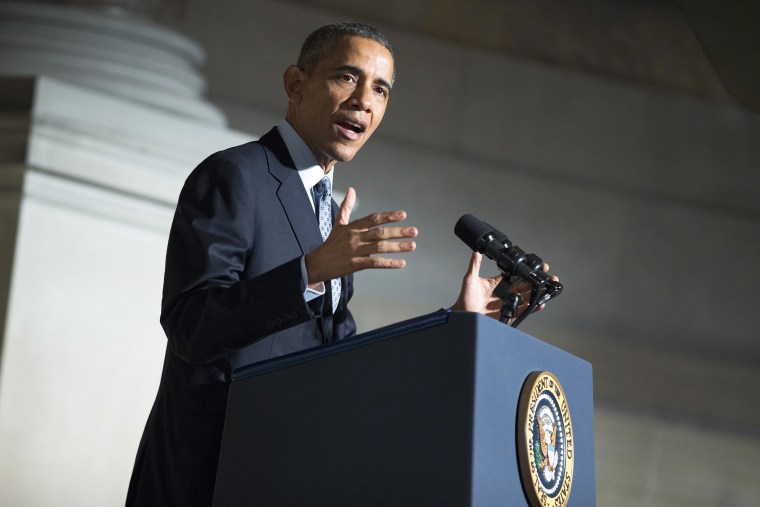After the president's year-end press conference at the White House on Friday, Politico ran an attention-getting headline: "Obama spikes the football."
After watching this president closely, I've long believed bragging isn't his strong suit. For all the Republican assumptions about his so-called "arrogance," Obama generally does a poor job when it comes to touting his own successes -- prompting many of his supporters to often wish he "spiked the football" far more than he actually does.
And with this in mind, it was notable when the president told reporters Friday moments after reaching the podium, "As I look back on this year, one thing I see is that so much of our steady, persistent work over the years is paying off for the American people in big, tangible ways." Obama started rattling off successes, and the list wasn't short: a sharp drop in unemployment, growing wages, expanded access to affordable medical care, progress on the climate crisis, breakthroughs on civil rights, diplomatic accomplishments, and on and on.
We talked last week about how very wrong the conventional wisdom was a year ago about what to expect from the White House in 2015. After the midterm elections, Obama was largely written off, and it was widely assumed, incorrectly, that he'd have few if any accomplishments in his seventh year. The truth turned out to be the exact opposite.
But writing in RealClearPolitics yesterday, Bill Scher took an even broader view, providing useful context for the president's entire second term.
Presidential scholars have a term to describe the typical experience of a chief executive who wins re-election to the White House. It's called the "second-term curse." There's evidence for it. Midway through their second terms, George W. Bush suffered Hurricane Katrina and the Iraqi quagmire, Bill Clinton was impeached, Ronald Reagan was staggered by the Iran-contra scandal, and Richard Nixon was run out of town. At the risk of jinxing our current president with one year left to go, he appears to have broken the curse.
Sure, there's still a year to go in this second term, but Scher's observation is sound.
At least in modern terms, it's tough to top Obama's first term when it comes to major successes: ending the Great Recession, passing health-care reform, overhauling Wall Street safeguards, rescuing the American auto industry, etc.
But the president's second term ranks among the more important of any modern two-termer, most notably because of historic accomplishments on foreign policy: an international nuclear agreement with Iran; overhauling a failed U.S. policy towards Cuba; a breakthrough global climate-change agreement, and so on. If his executive actions on immigration clear the courts, it will be another important piece of his second-term legacy.
Those struggling with a "second-term curse" tend to struggle; Obama's done the opposite.
Scher makes the persuasive point that this president has avoided what many of his predecessors did not: a second-term scandal. Iran-contra, Watergate, and the Lewinsky affair were all second-term controversies. It's easy to lose track of all of George W. Bush's scandals, but many of the biggest -- including the U.S. Attorney fiasco, my personal favorite -- came after his re-election.
Obama, at least so far, hasn't had any meaningful scandals at all. Some manufactured controversies briefly caused stirs, but each were discredited, and ultimately exposed as little more than mirages for far-right conspiracy theorists. Center-right pundit David Brooks recently marveled at this "amazingly scandal-free administration."
What's more, let's not overlook the fact that many of the president's second-term successes, including some key Supreme Court victories, are the culmination of fights that began in his first term, only to be wrapped up more recently. The Washington Post's Chris Cillizza added on Friday, "[R]egardless of your politics, it's hard not to look at the last year and see a whole lot of checked boxes on Obama's long-term priority list. And the ability to check those boxes in the seventh year of his presidency proved, beyond any question, that Obama remained not only relevant but a force to be reckoned with, politically speaking."
Bill Scher's piece concluded, "Future presidents, in either party, will do themselves a favor by following the Obama model." That sounds like good advice.
